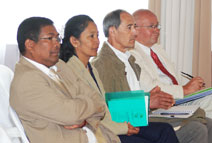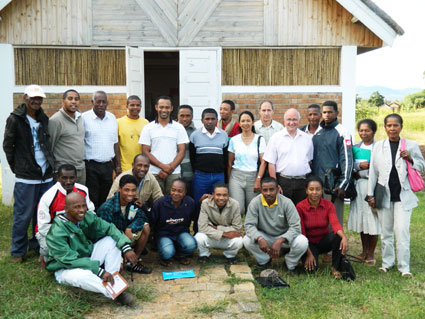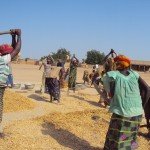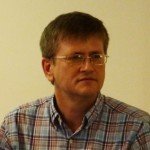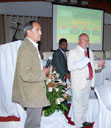
To JFT : You realize for the first time a mission to Madagascar in the partnership Fifata – Fert – Cneap, which had the most impact on you and what did you take away from it?
Madagascar is a country that has real human potential. In this mission, I had a lot of satisfaction to meet alumni, directors and college professors, members of peasant associations management. I feel a genuine enthusiasm and passion for improvement and all the possibilities that can offer this training in agricultural colleges.
Unfortunately, corruption and lack of virtuous leaders is bad for everyone.
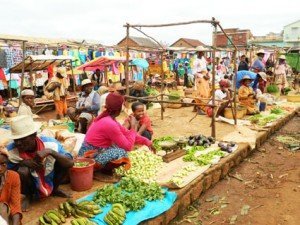
For all professionals involved met or former college students with whom we could share, we noted the vision, clear analysis of the situation and for a moment, I’d believed that I was in a professional organization !
It was a rich experience of meeting people, very interesting because I had access to a lot of information in a very short time. In addition, Madagascar is a beautiful country, a country of contrasts where extreme beauty rubs insecurity, widespread theft, the precariousness …
To YLN : You had already carried out missions to Madagascar in the partnership Fifata – Fert – Cneap. What was special about this mission ?
This mission was at a point in history where the agricultural colleges must take organizational and structural policies. Until now, colleges are related to each other, the coordination is mainly provided by Fert at the moment. Now, it is time to give each school a stronger associative base and gradually create the sharing, exchange, a common expression based on a shared and project and common services. This is a step federation in which the educational project is a fundamental given. It is therefore to find a good way for federal project which is expressed through all member colleges.
In this approach, we met several types of actors involved in the network : young students just out of college, truly remarkable, students in training and parents, small farmers who can do two days of walking and taxi to attend a meeting with us (who disembark the plane!) people involved, invested heavily in professional action in Fifata; former parents pupils remained in management associations of colleges and course coordinators college project or other projects supported by Fert. These meetings were true moments of healing for us. I have great respect for the people we met. I get amazed at the human wealth of the country and almost weeping before the difficulty of valuing the human wealth due to local human contingencies of all kinds.
Your combination combined a professional engaged in various local and regional agricultural authorities (agricultural union, Crédit Agricole, agricultural college, …) and a representative of a national network of private agricultural education. What do you advise this young network of agricultural colleges now think with Fifata to be structured as a federation?
JFT:
For my part, it was above all to testify about the operation of our school of St-Jean-Pied-de-Port, to explain how we are federated at the regional level, how decisions are made, etc. Our interlocutors were very attentive to these issues.
With Yvon Le Norcy, we were very complementary: it brought its expertise in the development of appropriate educational content, on the functioning of an institution of federal model, as I introduced myself first as a farmer. I told them how I upgrade my farm until today offering direct sales. It was a very constructive dialogue, and I also have very good memories of our collaboration with Yvon Le Norcy.
We particularly emphasized the importance of creating a federation first to ensure proper recognition of the base, but also to share knowledge and resources. This testimony, very pragmatic and concrete, seduced them. But in their context, the issue of the removal of colleges from each other, the roads and the lack of communication is still a major obstacle to allow real exchanges.
YLN:
Rather than advise, we had essentially a posture of listening.
We were very impressed by the will, competence and the degree of commitment of people.
We tried to restore our malagasy partners how we, in our context, had experienced the gradual construction of a federation like the Cneap. We explained the stages through which we passed, gave evidence to enable them to make choices in their own context.
We used to say that the Cneap is:
- A federation, that is to say, a representation of the database with different levels of instances, which is actually a ‘union of associations’ federation representative speaking on behalf of the people it represents;
- A movement, because it takes activism to sustain this system, search the general progress and to share the common interest;
- A network where everyone brings what he can do and express what he wants to do, a network where each is enriched by the diversity bringing by the others.
Malagasy colleges could stick to this “network” configuration, but a network does not speak on behalf of the structures that evolve there, he does not represent anyone. In a federation, representatives are elected to wear what the members want. In the context of National strategy for agricultural and rural training (SNFAR), take positions is a major issue.
Returning from this mission, and while the first college soon celebrate their 10 years of operation, what do you want for the future of the network of agricultural colleges in Madagascar?
JFT:
I think the quality of training in these four agricultural colleges, both theoretical and practical, can really help to demonstrate the relevance of this teaching because young trained certainly become real players in rural development in their respective localities . With more communication and more sharing between teachers and students, there will be a real healthy emulation between the four institutions.
In our discussions with the malagasy institutions, especially during the day animation held in Antananarivo in the Action Plan for Rural Development (PADR) where we testified, we felt there was something more in the teaching referential of agricultural colleges and many malagasy institutions have already noted it.
Finally, it also remains the network to consider the challenge of financial autonomy. They will have to find other funding partners to ensure the operation of the first four, better networking and consider creating other institutions.
YLN:
Today I want 4 things from the actors of the network:
- Always remain as now, first concerned the quality of the training of young people and their employability;
- Fast enough to measure the scope of their responsibility, especially of what remains to be done to have the means to manage their colleges. Find out how very gradually from the dependence of subsidies in which they live, and tag with their partners the way to go;
- Timely and stability of the Malagasy state necessary for the sustainability of partnerships (Fifata, Fert), and their positioning in the SNFAR;
- Develop territorial coverage by agricultural colleges. At 4, they are important, at 10 they will be real keys. The teaching referential they created will be stronger and more tonic, and their federation will weigh more in the choice of the state in agricultural and rural training.
Currently, he released 80 young graduate each year from colleges ; with 10 schools, will come out 250 or 300. But it is not enough to multiply so that the system is perpetuated and the need for training of malagasy farmers are satisfied.
It should probably be included in the project of each college leaver does become ‘player development.’ This requires an explicit project coordination between colleges, regional coordinators accompany the youth in their integration and those who pass through the Ceffel, regardless of their activity. All represent a distribution network, extension of the project and can be multipliers agents. They may be accompanied, associated and recognized by professional organizations. In addition to the statutory construction of a federation of colleges, which is essential to them, why not start by these cautionary synergy of actors collective progress?
“There is no possible unity that respects diversity, there is no viable peacefully diversity that is in search of unity.” Edgar Pisani, 2006.
For me it is a kind of principle of life. In Madagascar, where training initiatives are multifaceted, it might be tempting to standardize (1 repository, 1 donor, 1 type of structure formation …), yet this sign depletion and perhaps sterilization initiatives. We can coexist without confusion, and it gives flavor to projects: one is oil, other vinegar, you can mix them, but they can complement each other to make a good vinaigrette! It is no doubt a unique vision of the purpose of education, but the means to achieve may be different. They already are and would be happy they remain.

